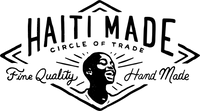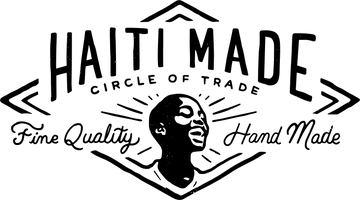
Who Made My Clothes? #FashionRevolutionWeek

This year Haiti Made is proud to take part in Fashion Revolution’s Fashion Revolution Week, an annual initiative that marks the anniversary of the Rana Plaza factory collapse in Bangladesh on April 24, 2013, where over 1100 lives were lost in the collapse due to unsafe conditions and negligence. Despite this horrendous tragedy, fashion around the world is still manufactured and produced in similar working conditions to those that existed at the Rana Plaza in Bangladesh. Fashion industry workers around the world are still suffering as a result of how fashion is unsustainably manufactured, sourced, and purchased. With these issues of sustainability and working conditions still at the forefront, it’s more important than ever for us all to ask “Where Did My Clothes Come From?” and “Who Made My Clothes?”
For us at Haiti Made the issues of sustainability and working conditions run deep at the heart of what we do and why we do it. Haiti Made was born out of a deep desire to see Haitians and Haitian communities empowered by dignified and sustainable employment as a part of a larger effort to promote economic growth and sustainability in the country. More than half of Haiti’s population currently lives in abject poverty, and the orphan and child slavery crisis in Haiti has in large part been fueled by the lack of employment and very low wages.
With these factors spiraling Haiti into further economic turmoil, job creation has been proven to succeed where perpetual aid measures have failed. Dignified employment and fair wages mean the provision and preservation of family and community which translates to long term stability. By joining the Haiti Made team, each worker is able to make a fair wage and gain the professional skills necessary for career advancement. As a “Circle of Trade” united around quality products, dignified employment, and grounded in a “hand up” rather than a “hand out” philosophy, Haiti Made will continue to empower our employees and continue the fight in delivering economic sustainability to Haiti as a whole.
It’s more important than ever that we all ask “Who Made My Clothes?” and how our spending habits are affecting how they are made. Like Fashion Revolution, Haiti Made believes the more awareness we can bring to the stories behind our clothes/products, the more impact we can have across the fashion industry to raise standards for workers and the environment, all while improving respective communities and countries around the world. Your curiosity, your voice, and your shopping habits are more powerful than you know.
To find out more about Fashion Revolution and the #FashionRevolutionWeek initiative, please visit www.fashionrevolution.org.


